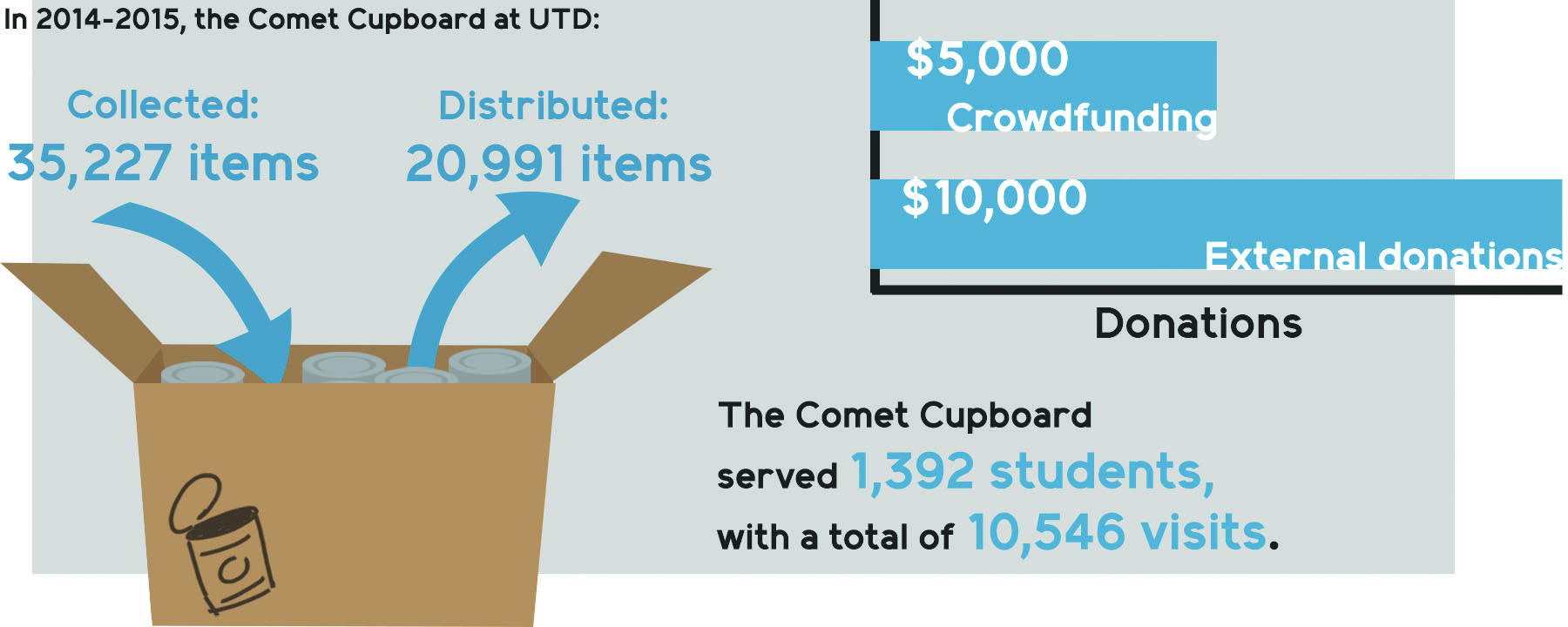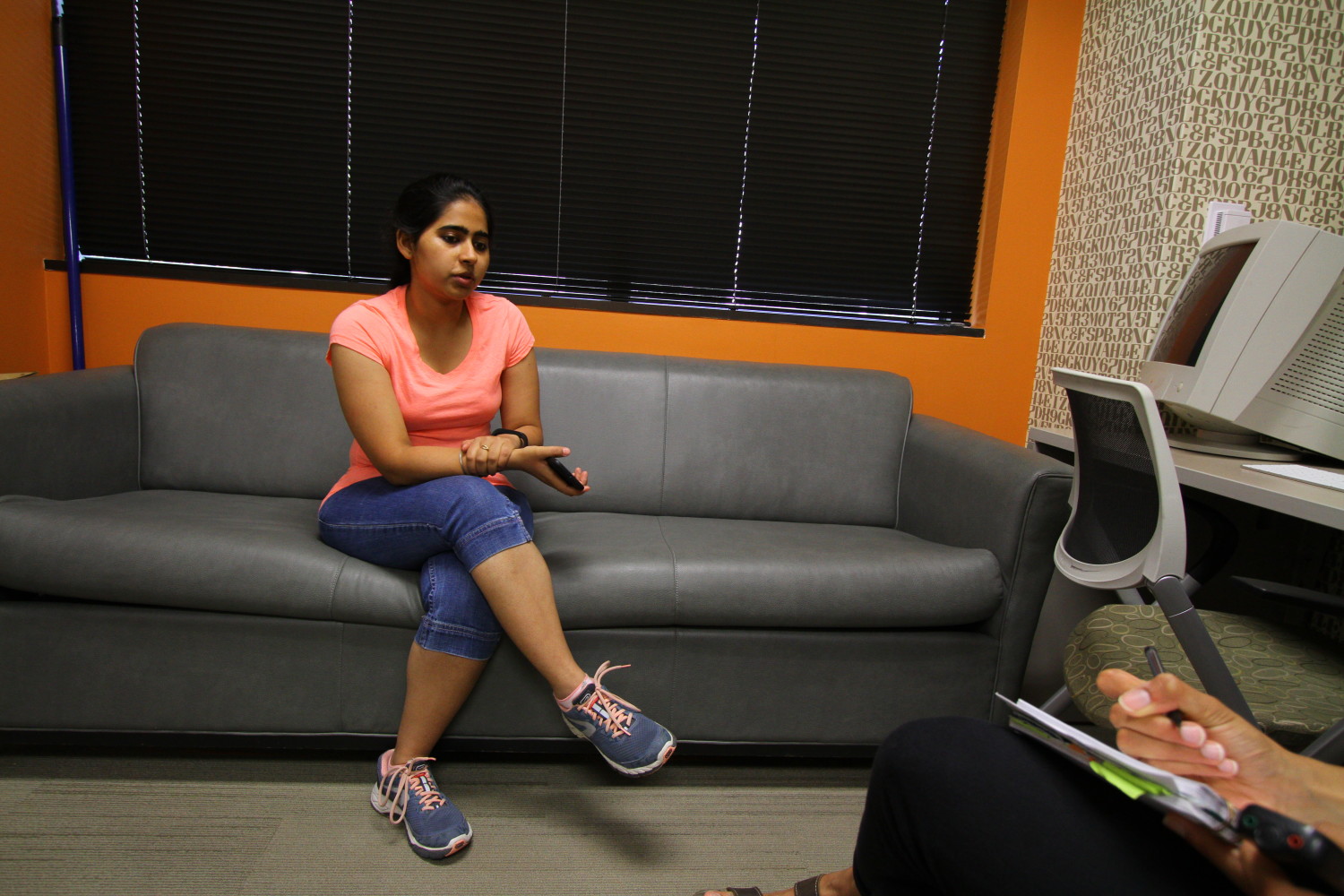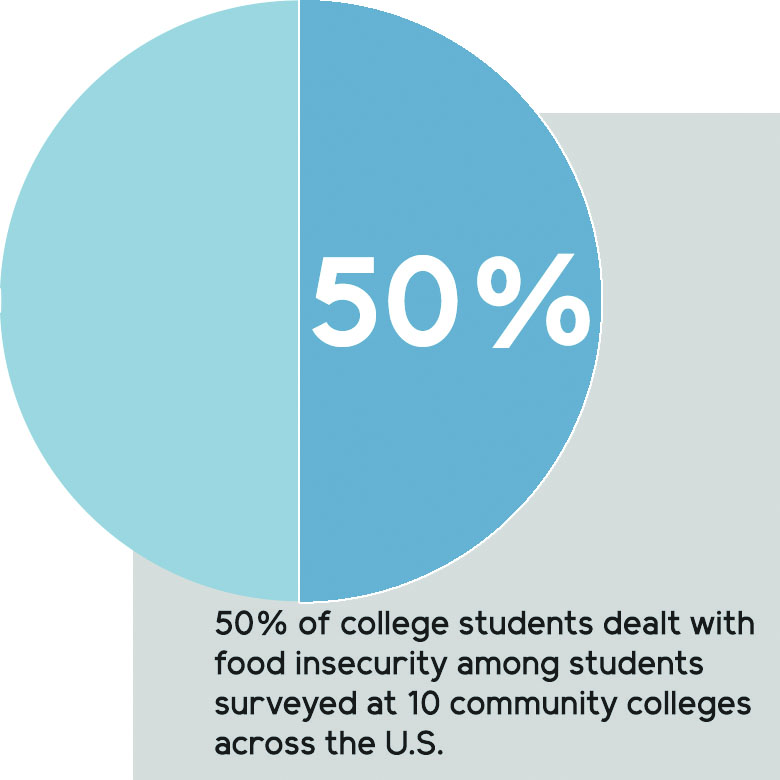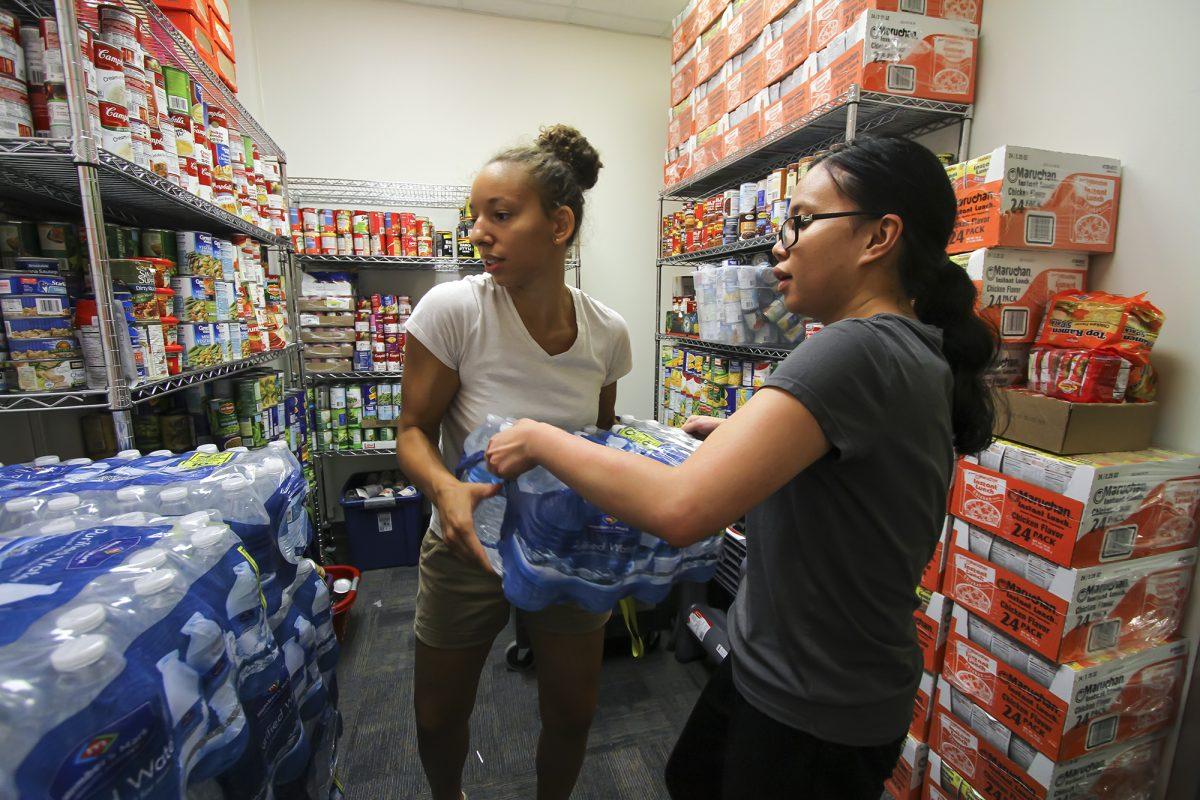Shrenik Jain stepped through the threshold of a small space in the ground floor of the Eugene McDermott Library. He scanned row after row of food items until one container caught his eye — it was a jar of peanut butter.
The mechanical engineering graduate student’s interest piqued because he’d never tried the spread before.
“I (had) heard about it a lot in (TV shows) and movies and everywhere,” Jain said. “I was just curious about why it’s so famous here in America. Peanut butter is not (available) in India at all.”
The creamy texture and slightly sweet taste of the spread clicked with Jain and he’s been hooked ever since.
“I really liked it. … I just grabbed a bottle of it over there and I tried it. It was really awesome.”
Jain’s experience illustrates just one of the many unique ways the Comet Cupboard, a food pantry on campus, serves the student population at UTD.

The Comet Cupboard opened in fall 2013, when the undergraduate education faculty started noticing a trend of students struggling to feed themselves when other expenses took priority.
“In the course of day-to-day interactions with students … (the faculty) would get details about an individual student’s situation,” said Hillary Campbell, the assistant director for undergraduate student engagement programs. “(There were) enough of these stories to say ‘Wow, you know, it’d be easy to look at all these beautiful trees and think everything’s just green, everyone is happy and fully settled,’ but in reality, we were hearing other stories to the contrary.”
In 2015, a study was conducted by the Wisconsin HOPE Lab that revealed just over 50 percent of the students surveyed in 10 community colleges across the nation suffered from food insecurity. These students went hungry and some even gave up housing to cover the cost of tuition.
Although there is no data extrapolating what food insecurity looks like among all college students, Feeding America, a national network of food banks, estimates about half of its college-aged users compromise on food to cover educational expenses.
Amber Brown, a public affairs graduate student and a coordinator at the Cupboard, said these national trends are reflected at UTD and have increased the Cupboard’s impact on campus.
“We looked at just research data on what food insecurity looked like. Then, (we) looked directly at our campus,” she said. “Everything has just grown, which just shows the need and obviously when you start off you have to prove that there’s a need to do anything and it catches on.”
Brown explained that there is regularity among users and they’re familiar with how the pantry is stocked.
“You can tell that the people who use it actually need it because they come back,” she said. “When they do use it, you can tell our numbers go up and down. If we don’t have much food, then people don’t use it as much because there’s not much they can take. So, they’re aware of how the shelf is going in the Cupboard. They’re not like, ‘Oh I had no idea there was no food in here.’ No, they know because they’ve been coming consistently.”
Apurva Kulkarni, an electrical engineering graduate student and a regular user of the Cupboard, echoed Brown’s observations.
“Initially, I didn’t know what was there, so I would just come with an empty mind and see whatever I get but now I always know what is stocked and how things are moving so now I know if I want anything it will be there 90 percent of the time,” she said. “It’s always reliable, I never come back empty.”

Kulkarni said as an international student who’s recently moved to the United States, she doesn’t have a driver’s license or a vehicle yet, which requires her to put more thought into her grocery shopping trips.
“I (can’t) commute to wherever I want to everyday,” she said. “So, in case something (runs out) at home, it takes time to go somewhere to buy groceries.”
Towards the end of the spring semester, she relied heavily on the Cupboard to supply healthy options when she was burdened by a rigorous courseload.
“I didn’t have time to go anywhere to buy groceries. I would go home at 2 o’clock and get up early in the morning and come back here to the lab, so then I would just go to the pantry. … It’s much, much better as compared to the junk food. The canned beans (and) canned soups really helped me at that time.”
Kulkarni said she has friends who had to cut down on their expenses, so the pantry was an indispensable resource in helping them do so.
“They work on campus (and) send money back home because they’re supporting a family, so they would try to spend less here and in that case they used the pantry,” Kulkarni said.
For some students, like Jain, the Cupboard is a place where they can try new foods and figure out what American options they have a taste for.
“The kind of snacks we have in India, we can’t find anything like that (in America), so at that time I definitely needed to find something I can eat as a snack,” Jain said. “There are a lot of new things here, which I don’t even know, so I’m not sure whether I like it or not. I grab it (at the Cupboard), try it and if I like it, I can buy it from somewhere else.”

Since it opened, the Cupboard’s distribution count has risen to 20,991 items in the 2014-2015 academic year. In that same year, the pantry received $10,000 in external donations and 1,392 students used its resources.
If there are instances where the pantry runs low on stock, the staff encourages specific donations from campus-wide departments.
“We’ve started something called shelf stars, (which is) an item specific food drive,” Brown said. “So, usually when we go low, we’re just low in a specific item that people want. It’s hard for them to want to come because we don’t have what they need.”
If these drives aren’t effective, the staff uses donation money to restock the shelves.
The Cupboard also takes advice from other pantries within the College and University Food Bank Alliance, an organization in which UTD’s pantry is a charter member.
“(We sought) guidance from university food pantries that (have) gone before us,” Campbell said. “Since we’re young, the veteran food pantries could stand to give us some guidance when it came to trouble shooting potential issues and just the experience, making decisions about how to vet users or not.”
As of June 23, there are 325 active members in CUFBA, which is almost nine times larger than the membership when UTD’s Comet Cupboard joined in 2013.
Happy with the increasing numbers, Campbell said it means more students are learning the valuable lessons the Cupboard can teach.
“We all live in this world together (and) we share this real estate and we want to become engaged, civil people and so understanding that the people sitting next to you in class may have all sorts of things going on, you have no idea, and serving each other is a great way to learn how to serve the greater world post-graduation,” Campbell said.
Cupboard’s Summer Hours: Mondays, Wednesdays, Fridays 12 P.M. to 3 P.M.
Cupboard’s Fall/Spring Hours: Monday – Friday 12 P.M. to 6 P.M.











